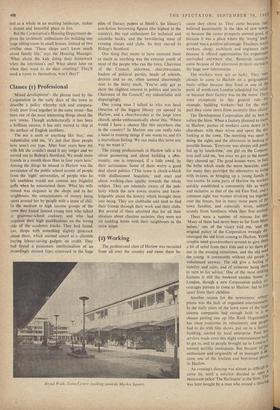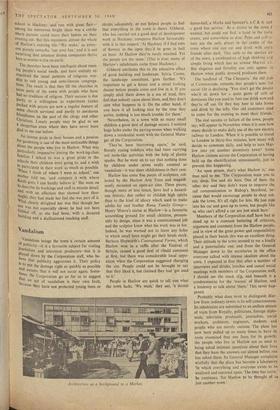(2) Working
The professional class of Harlow was recruited from all over the country and came there be-
Broad Walk, Town Centre, looking towards Market Square,
cause they chose to. They came because they:;;,; believed passionately in the idea of new towns, or because the career prospects seemed good, or because it was a place where the 'wrong' back' ground was a positive advantage. Teachers, social workers, clergy, architects and engineers came because it offered opportunities for experiment unrivalled anywhere else. Research scientists came because of the enormous projects started in the huge new laboratories.
The workers were not so lucky. They were chosen to come to Harlow on a geographical basis-L-cither because they lived in one of the parts of north-east London scheduled for relief, or because their factory was on the move. There were exceptions to this general rule—for example, building workers=but for the most part they came more from necessity than choice, The Development Corporation did its best to soften the blow. When a factory planned to move to Harlow, parties of workers came down in a charabanc with their wives and spent the daY looking at the town. The morning was spent in doing the sights and the afternoon in looking at possible houses. 'Everyone was always still pretty fed up by lunch-time,' one girl on the Corpora' tion staff told me, 'but once we got to the houses they cheered up.' The good houses were, in fact' the bribe which made the move bearable, since for many they provided the alternative to living with in-laws, or bringing up a young family in two rooms. In some parts of Harlow the workers quickly established a community life as warm and inclusive as that of the old East End, and common sight was women drinking tea together over the fences, but in many more parts of the town families, and especially wives, suffered acutely from loneliness when they first arrived' There were a number of reasons for this' 'Many of them had never been so far from Mum before,' one of the vicars told me, 'and the original policy of the Corporation wrongly dis- couraged the old from coming to Harlow. Young couples need grandmothers around to give them a bit of relief from their kids and to let them get out in the evening sometimes, and the old need the young. A community without old people is unbalanced anyway. The old give a feeling of stability and calm, and of someone being there to turn to for advice.' One of the most striking features is still the weekend exodus 'home' to London, though a new Corporation policy en• courages parents to come to Harlow. but to live apart from their children.
Another reason for the newcomers' un piness was the lack of organised entertainment' In the early years of the town none of the large cinema companies had enough faith in it t° chance putting one up (the Rank Organisation has since overcome its reluctance), and Peale had to do with film shows, put on in a factory building, started by local enterprise. Poor bus services made even this slight entertainment Nil/ to get to, and to people brought up in London it seemed terribly inadequate. But because of the enthusiasm and originality of its manager it be came one of the liveliest and best-loved Olt'es in Harlow.
An evening's dancing was almost as difficult t: come by, until a solicitor decided to open restaurant called 'The Harlequin' at the Stow. This was later bought by a man who owned a dancing
school in Hackney, and run with great flair— among his numerous bright ideas was a creche where parents could leave their babies on their evening out. But this represents almost the whole of Harlow's evening life. 'We make,' as every- one piously remarks, 'our own fun,' and it is not surprising that amateur drama companies thrive here as nowhere else on earth.
The churches have been intelligent about meet- ing People's social needs, and have entirely re- organised the usual patterns of religious wor- ship to suit young and semi-literate congrega- tions. The result is that they fill the churches in some parts of the town with people who have had no tradition of religion. Their success is due Partly to a willingness to experiment (aisles Packed with prams are now a regular feature of some church services) and partly to assiduous friendliness on the part of the clergy and other Christians. Lonely people may be glad to see a Clergyman even where they have never been glad to see one before.
An intense pride in their houses and a passion for gardening is one of the most noticeable things about the people who live in Harlow. What was Particularly impressive among the working-class families I talked to was a great pride in the schools their children were going to, and a wish to Participate in their work as much as possible. When I think of where I went to school,' one Mother told me, 'and compare it with where Keith goes, I can hardly believe it.' She went on to describe its workings and staff in minute detail, and with an affection that showed how thor- oughly they had made her feel she was part of it. What clearly delighted her was that though her 8.°n was not especially clever he had not been fobbed off, as she had been, with a decayed building and a disillusioned teaching staff.











































 Previous page
Previous page